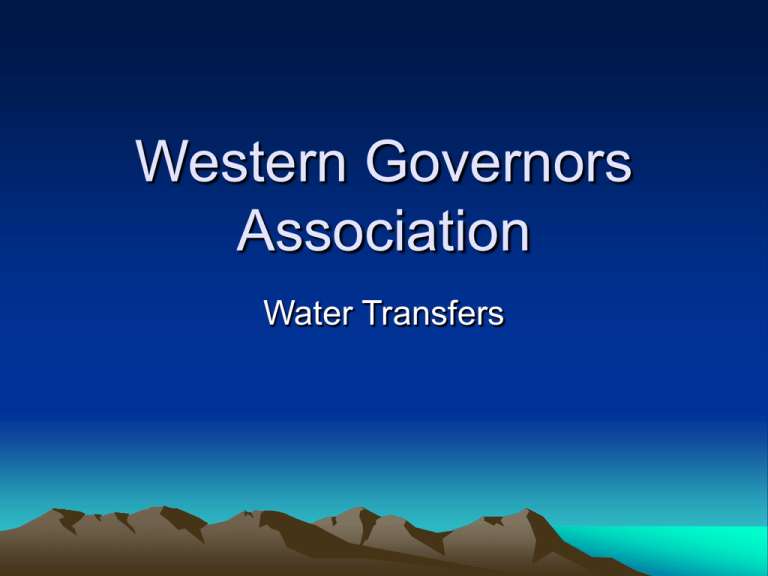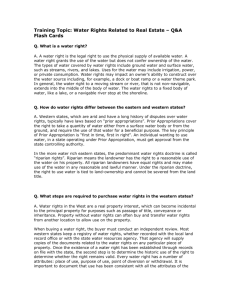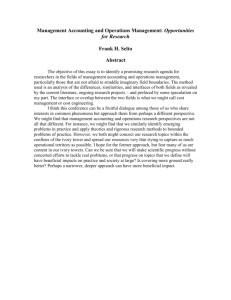
Western Governors
Association
Water Transfers
Who is the WGA?
• http://www.westgov.org/about/governors
Adam Smith
• Invisible hand
• It is not from the benevolence of the
butcher, the brewer, or the baker that we
expect our dinner, but from their regard to
their own interest
• Supply and demand
• Two independent goals
Water
•
•
•
•
Public Good
Private Good
Multiple Uses
Mutually Exclusive Competing Ends
New Markets
• Air Emissions
• Open Space
– Nature Conservancy
• Oil Leases
• Energy Production
• Carbon Markets
Jennifer Pratt, EDF
• In the 21st Century, western states
depend on a reliable water management
system to sustain not only irrigated
agriculture and growing cities, but also the
economically vibrant recreational, fishing
and rural sectors that depend on healthy
rivers.
Dale Mauch, farmer
• We live in a desert. Water is worth more in
the Front Range. The question is: how can
we farm as long as we can under this
reality?
Brianna Randall, CFC
• Water is central to everything we care
about in the West. But as water demands
increase, groups like the Clark Fork
Coalition are being challenged to conserve
the flows in our streams and rivers.
Phillip C. Ward, WSWC
• All of the western states face challenges
from growth, and we can’t be certain of
how much are we going to grow and how
much water we will need
California Constitution
• SEC. 2. It is hereby declared that because of
the conditions prevailing in this State the general
welfare requires that the water resources of the
State be put to beneficial use to the fullest extent
of which they are capable, and that the waste or
unreasonable use or unreasonable method of
use of water be prevented, and that the
conservation of such waters is to be exercised
with a view to the reasonable and beneficial use
thereof in the interest of the people and for the
public welfare.
Surface Water
• The right to water or to the use or flow of
water in or from any natural stream or
water course in this State is and shall be
limited to such water as shall be
reasonably required for the beneficial use
to be served, and such does not and shall
not extend to the waste or unreasonable
use or unreasonable method of use or
unreasonable method of diversion of
water.
Riparian Rights
• Riparian rights in a stream or water course attach to, but
to no more than so much of the flow thereof as may be
required or used consistently with this section, for the
purposes for which such lands are, or may be made
adaptable, in view of such reasonable and beneficial
uses; provided, however, that nothing herein contained
shall be construed as depriving any riparian owner of the
reasonable use of water of the stream to which the
owner's land is riparian under reasonable methods of
diversion and use, or as depriving any appropriator of
water to which the appropriator is lawfully entitled.
Why Water Transfers?
• Riparian and Appropriative rights lead to
gross inefficiencies due to the use it or
lose it rules.
• Water does NOT flow to the highest value
of use.
• Unlike appropriative users, riparian right
holders were not required to put water to
reasonable and beneficial use.
CA State Water Board
• A water right is a legal entitlement authorizing water to be diverted
from a specified source and put to beneficial, nonwasteful use.
Water rights are property rights, but their holders do not own the
water itself. They possess the right to use it. The exercise of some
water rights requires a permit or license from the State Water
Resources Control Board (State Water Board), whose objective is to
ensure that the State’s waters are put to the best possible use, and
that the public interest is served.
• In making decisions, the State Water Board must keep three major
goals in mind:
– developing water resources in an orderly manner;
– preventing waste and unreasonable use of water; and
– protecting the environment
Beneficial?
•
•
•
•
•
•
•
•
•
•
•
•
•
•
•
•
Beneficial Use refers to a reasonable quantity of water applied to a non-wasteful
use. Potential beneficial use options for produced water include:
Click to enlarge
Domestic
Livestock watering
Industrial
Commercial
Agriculture irrigation
Mining
Fishery
Wildlife maintenance and enhancement
Recreational
Fire protection
Dust suppression
Preservation of environmental and aesthetic values
All other uses compatible with the enjoyment of the public waters
Colorado
• Beneficial use in Colorado is statutorily
defined as "the use of that amount of
water that is reasonable and appropriate
under reasonably efficient practices to
accomplish without waste the purpose for
which the appropriation is lawfully made".
Beneficial Uses
• http://aqwatec.mines.edu/produced_water/
intro/what/index.htm
• Table 1
Ground Water
• In most areas of California, overlying land
owners may extract percolating ground
water and put it to beneficial use without
approval from the State Board or a court.
California does not have a permit process
for regulation of ground water use. In
several basins, however, groundwater use
is subject to regulation in accordance with
court decrees adjudicating the ground
water rights within the basins.
Ground Water
• The California Supreme Court decided in the 1903 case
Katz v. Walkinshaw that the “reasonable use” provision
that governs other types of water rights also applies to
ground water. Prior to this time, the English system of
unregulated ground water pumping had dominated but
proved to be inappropriate to California’s semiarid
climate. The Supreme Court case established the
concept of overlying rights, in which the rights of others
with land overlying the aquifer must be taken into
account. Later court decisions established that ground
water may be appropriated for use outside the basin,
although appropriator’s rights are subordinate to those
with overlying rights.
Common Pool Issues
• Pump Fast
• As with oil and natural gas
• Subsidence
Conflicts
• The State Board also is responsible for investigating
possible illegal, wasteful or unreasonable uses of water,
either in response to a complaint or on the State Board’s
own initiative. If the State Board’s staff investigation
determines that a misuse of water is occurring, the
Board generally notifies the affected persons and allows
a reasonable period of time to terminate the misuse. The
State Board may also hold a hearing to determine if a
misuse of water has occurred or is occurring. Water
users who do not terminate a misuse of water are
subject to various administrative enforcement measures
including possible fines and revocation of a permit or
license. In appropriate cases, the State Board may also
seek judicial relief in the courts.
Transfers
• In recent years, temporary transfers of
water from one water user to another have
been used increasingly as a way of
meeting statewide water demands,
particularly in drought years. Temporary
transfers of post 1914 water rights are
initiated by petition to the State Board.
Reviews
• If the Board finds the proposed transfer will not
injure any other legal user of water and will not
unreasonably affect fish, wildlife or other
instream users, then the transfer is approved. If
the Board cannot make the required findings
within 60 days, a hearing is held prior to Board
action on the proposed transfer. Temporary
transfers are defined to be for a period of one
year or less. A similar review and approval
process applies to long-term transfers in excess
of one year.
Area of Origin
• California's area of origin statutes were
born in the crucible of conflict between
residents of Owens Valley and the City of
Los Angeles in the early 20th century. This
struggle reached its nadir when some
deeply frustrated residents seized the
Alabama Hills diversion gates for the Los
Angeles Aqueduct and later detonated a
bomb that severed an Aqueduct pipeline in
1927.
CVP and SWP
• Areas of California beyond the reach of
the State Water Project and the Central
Valley Project's water rights do not receive
water right reservations under these laws.
This means that the areas of origin for San
Francisco's Hetch Hetchy water supply,
East Bay MUD's Mokelumne River water
supply, and Los Angeles' Owens Valley
and Mono Basin supplies are exempt from
area of origin rights.


